Over 40% of digital asset traders received IRS penalties last year due to incomplete or inaccurate filings. As decentralized finance grows, the complexity of tracking transactions across wallets, exchanges, and protocols has created a compliance crisis. By 2025, experts predict global crypto tax regulations will tighten further, making manual reporting nearly impossible for most users.
Specialized tools now automate this process, transforming chaotic transaction histories into audit-ready reports. Platforms integrate with TurboTax and similar services, streamlining workflows for individuals and institutions alike. These solutions address critical challenges: reconciling cross-chain activity, calculating capital gains, and aligning with evolving regulatory frameworks.
The market’s rapid expansion demands software that simplifies reporting processes while maintaining precision. This analysis evaluates top contenders based on accuracy, scalability, and adaptability to emerging standards. From real-time portfolio tracking to automated Form 8949 generation, modern systems eliminate hours of manual work while reducing error risks.
Key Takeaways
- Automated reporting tools prevent costly filing errors as regulations intensify
- Cross-platform compatibility ensures seamless integration with existing tax workflows
- Advanced platforms support both individual investors and institutional clients
- Real-time capital gains calculations adapt to market volatility
- Audit defense features provide documentation for IRS inquiries
Introduction to Cryptocurrency Tax Compliance in 2025

Global authorities are intensifying oversight of digital asset activities, creating new hurdles for investors. Tracking gains across decentralized platforms now requires navigating layered reporting standards. This shift makes manual methods obsolete for modern portfolios.
Crypto tax obligations have grown exponentially due to cross-chain swaps and yield farming. Even casual traders face intricate rules for staking rewards or NFT sales. Mismanagement risks audits, penalties, and legal scrutiny.
Automated solutions transform chaotic records into organized filings. They identify taxable events across wallets and exchanges, applying location-specific rates. Precision matters as 60% of disputes stem from valuation errors during volatile markets.
Adopting specialized tools ensures alignment with evolving frameworks. These systems calculate liabilities while flagging discrepancies in real time. For institutions, they streamline multi-jurisdictional reporting without manual intervention.
This guide explores platforms that simplify taxes on digital holdings. From DeFi protocols to enterprise-grade analytics, readers will discover tailored strategies for compliance. Mastery of these tools becomes essential as regulations tighten worldwide.
Understanding cryptocurrency tax compliance software 2025
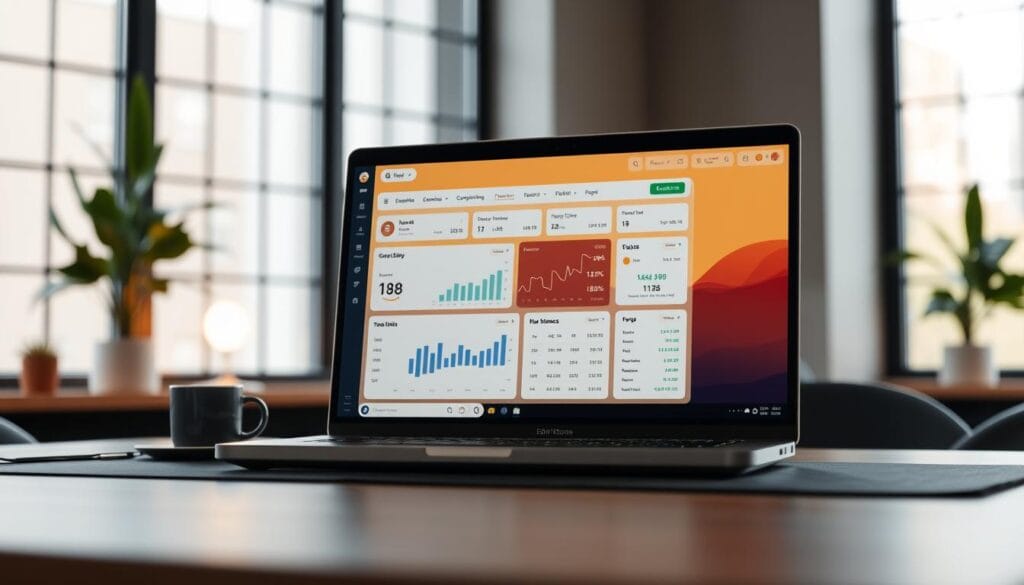
Modern portfolio tracking requires specialized systems to handle cross-exchange transactions and decentralized protocols. These platforms consolidate data from wallets and trading accounts through secure API connections. By automating transaction imports, they eliminate manual entry errors that plague traditional methods.
Leading solutions sync with over 500 exchanges, capturing every swap, yield reward, and NFT transfer. Real-time synchronization ensures capital gains calculations reflect current market values. Advanced algorithms classify activities into taxable events using jurisdiction-specific rules, crucial for accurate filings.
These tools serve dual purposes: maintaining organized financial records and generating audit-ready reports. Users benefit from unified dashboards showing realized gains, loss harvest opportunities, and estimated liabilities. For complex DeFi positions, some systems apply lot identification methods matching IRS preferred accounting standards.
Integration capabilities extend beyond data collection. Top-tier platforms export formatted reports compatible with popular tax preparation services, creating seamless workflows. This interoperability proves vital as regulatory requirements evolve across multiple jurisdictions.
By combining transactional accounting with compliance features, these systems address two critical needs simultaneously. Investors gain clarity on obligations while maintaining defense-ready documentation. As decentralized finance expands, such platforms become indispensable for navigating layered reporting demands.
How Cryptocurrency Tax Software Simplifies Tax Filing
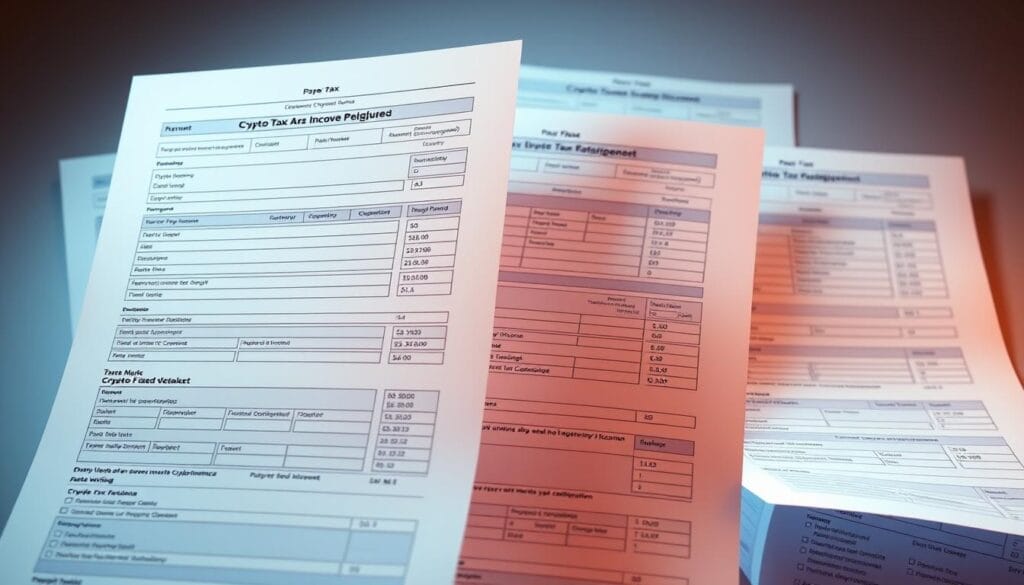
Advanced algorithms streamline the once tedious process of tax form preparation. These platforms aggregate data across exchanges through API integrations, automatically classifying transactions into taxable categories. Real-time synchronization ensures every swap, staking reward, or NFT sale is captured accurately.
The systems generate IRS-ready documents like Form 8949 and Schedule D by applying jurisdictional rules to transaction histories. Direct export features allow users to upload completed filings into TurboTax and similar platforms within minutes. This eliminates manual data transfers that previously consumed hours.
Automated scheduling tools track deadlines and estimated payments, reducing late-filing risks. By maintaining audit trails for every calculation, the software provides defensible documentation during IRS reviews. Users gain confidence knowing their submissions align with current reporting standards.
Time savings extend beyond form generation. Portfolio dashboards highlight loss harvesting opportunities while forecasting liabilities across multiple scenarios. For active traders, these insights prevent last-minute scrambles during filing seasons.
Integration with mainstream tax platforms creates cohesive workflows from data collection to submission. The result? Stress-free compliance achieved through precision-engineered automation.
Key Features to Look for in Crypto Tax Software
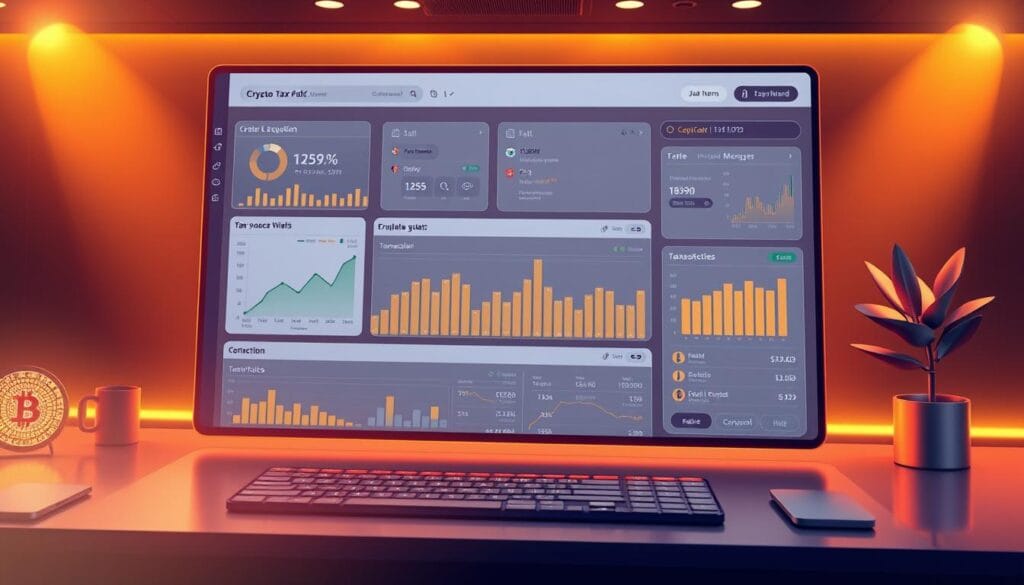
Modern financial tools demand robust capabilities to handle multi-platform transactions and regulatory demands. Three critical components separate basic tools from enterprise-grade solutions: comprehensive data aggregation, precision automation, and adaptive reporting frameworks.
Integration with Exchanges and Wallets
Top-tier platforms connect directly to 500+ trading venues and decentralized wallets via secure APIs. This eliminates manual data entry for swaps, staking rewards, and NFT transfers. Systems like CoinLedger demonstrate how unified dashboards merge activity across Coinbase, MetaMask, and Binance into coherent records.
Automated Tax Form Generation
Advanced systems transform raw transaction data into IRS-ready documents within minutes. Look for tools that auto-populate Form 8949 and Schedule D while applying location-specific rules. Koinly’s algorithm, for instance, flags discrepancies in cost basis calculations before submission.
User experience remains vital. Clear documentation and intuitive interfaces help traders verify data without accounting expertise. Platforms offering real-time liability forecasts and loss harvesting insights provide strategic advantages beyond basic compliance.
Prioritize solutions with TurboTax integration and audit trail generation. These features create seamless workflows while ensuring defensible records during reviews. As regulations evolve, adaptable systems prove indispensable for both casual investors and institutional users.
In-Depth Review: Koinly’s Tax Compliance Tools

Koinly streamlines digital asset reporting through automated data aggregation and intuitive dashboards. Its platform bridges the gap between complex blockchain activity and IRS-ready documentation, prioritizing accuracy for diverse trading strategies.
Stand-Out Features of Koinly
The system syncs with 300+ exchanges and wallets in under five minutes, capturing swaps, airdrops, and staking rewards. Real-time cost basis calculations adapt to FIFO or HIFO accounting methods, crucial for managing capital gains across volatile markets. Users particularly praise the visual transaction timeline that flags potential errors before filings.
Portfolio analytics highlight loss harvesting opportunities while forecasting tax liabilities. Koinly generates Form 8949 directly through TurboTax integration, reducing manual data transfers. The platform’s audit trail feature automatically documents every calculation step – a critical defense during IRS inquiries.
Opportunities for Improvement
While Koinly excels at exchange integrations, some DeFi protocols require manual input. The free plan’s 100-transaction cap frustrates active traders, pushing them toward paid tiers. Several users note advanced reporting tools could benefit from more customizable filters for institutional clients.
Pricing transparency remains a strength, though competitors offer better bulk discounts for enterprise accounts. Future updates could enhance NFT valuation methods and add real-time chat support. Despite these gaps, Koinly maintains its edge through reliable tax software performance and continuous regulatory updates.
Comprehensive Overview of CoinLedger’s Platform

CoinLedger redefines portfolio management through automated data unification and simplified workflows. The platform eliminates manual tracking by syncing with 300+ exchanges and digital wallets via secure APIs. Users gain instant visibility into trades, staking rewards, and transfers across platforms – critical for maintaining organized financial records.
User-Friendly Interface and Integration
The dashboard transforms complex transaction histories into visual timelines. Color-coded labels distinguish between swaps, airdrops, and other activities. One-click imports from platforms like Kraken and Trust Wallet reduce setup time to minutes rather than hours.
Real-time synchronization ensures calculations reflect current market values. Investors appreciate the drag-and-drop CSV upload option for unsupported exchanges. This flexibility prevents data gaps that often trigger reporting errors.
Pricing Structure and Key Benefits
CoinLedger offers three tiers: Starter ($49/year for 100 transactions), Premium ($99/year for 3,000 transactions), and Professional ($199/year for 10,000+ transactions). All plans include audit trail generation and TurboTax integration – a standout feature for seamless filing through top tax preparation services.
Educational resources enhance user confidence. Video tutorials explain capital gains calculations, while blog updates clarify regulatory changes. The platform’s accuracy in generating IRS-ready tax reports makes it a favorite among casual traders and tax professionals alike.
Comparative Analysis with Bitcoin.Tax and Other Tools

Investors face a critical choice between legacy systems and modern solutions for managing digital asset obligations. Bitcoin.Tax laid groundwork for automated reporting but struggles to match newer platforms in handling DeFi protocols or multi-chain transactions. Recent Trustpilot reviews show a 3.8/5 rating for Bitcoin.Tax versus 4.6/5 averages for competitors like Koinly.
Modern tools outpace pioneers through real-time data synchronization. While Bitcoin.Tax supports 50+ exchanges, alternatives connect to 300+ sources – including decentralized wallets. This gap creates manual work for users tracking staking rewards or NFT sales across chains.
“Newer systems reduced my form preparation time by 80% compared to older interfaces,” notes a verified CoinLedger user.
Accuracy differences emerge in complex scenarios. Bitcoin.Tax requires manual adjustments for margin trades or liquidity pool exits, while rivals automate these calculations. Form 8949 generation takes minutes on updated crypto tax software versus hours in legacy systems.
User experience separates contenders. Platforms like Koinly offer visual dashboards showing capital gains trends and audit trails – features absent in Bitcoin.Tax’s spreadsheet-style interface. As regulations intensify, streamlined reports and error-checking algorithms become non-negotiable for stress-free tax filing.
While Bitcoin.Tax retains loyal users, its static framework struggles with evolving crypto tax rules. Forward-looking investors prioritize platforms delivering continuous updates and cross-chain compatibility. The market clearly favors solutions balancing historical knowledge with cutting-edge functionality.
Detailed Look at CoinTracking’s Reporting and Analytics
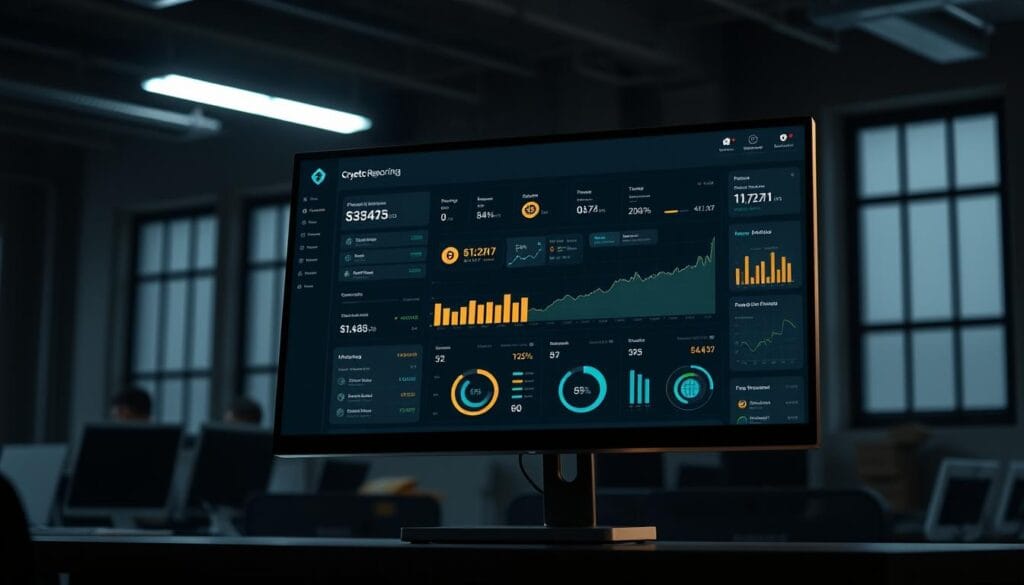
Data-driven traders require tools that transform raw numbers into actionable insights. CoinTracking aggregates transaction histories from 110+ exchanges through bulk CSV imports and API connections. Its unified dashboard compiles swaps, staking activities, and transfers into visual performance metrics – essential for optimizing trading strategies.
The platform generates reports in CSV, PDF, and JSON formats, catering to diverse user needs. Real-time portfolio tracking updates reflect market shifts instantly, while historical charts reveal multi-year trends. Traders identify capital gain patterns through heatmaps showing profitable vs. loss-making periods.
Advanced filters enable drill-down analysis by asset, date range, or transaction type. Customizable dashboards highlight tax liabilities alongside potential loss harvesting opportunities. These features empower users to make informed decisions backed by granular data visualization.
Professional accountants praise CoinTracking’s audit trails and GAAP-compliant outputs. One user notes, “The platform cut our reconciliation time by 70% during client reviews.” With institutional-grade security and multi-user access, it bridges the gap between casual investors and enterprise-level reporting demands.
Spotlight on TaxBit: Enterprise-Grade Tax Compliance

Corporate accounting departments increasingly rely on specialized systems to manage cross-border transaction volumes. TaxBit’s infrastructure scales for institutional clients, processing millions of data points across decentralized networks and traditional exchanges. Its API-first design integrates seamlessly with existing enterprise resource planning tools.
Benefits for Corporate Users
The platform automates tax reporting for entities with complex portfolios spanning multiple jurisdictions. Real-time ledger updates sync with accounting software like QuickBooks, eliminating manual reconciliation. This feature proves vital for firms handling 10,000+ monthly transactions.
TaxBit generates jurisdiction-specific filings while maintaining audit trails for every calculation. A Fortune 500 fintech director states:
“We reduced compliance errors by 72% after adopting TaxBit’s automated workflows.”
Role-based access controls allow simultaneous collaboration across finance, legal, and auditing teams. Customizable dashboards highlight exposure risks and regulatory deadlines. These tools empower corporations to navigate evolving frameworks without operational bottlenecks.
End-to-end encryption and SOC 2 certification address security concerns for sensitive financial data. As regulations tighten, TaxBit’s adaptive algorithms provide future-proof solutions for institutional tax management.
Extensive Features Offered by TokenTax

Navigating audit inquiries demands precise documentation – a challenge TokenTax addresses through its defense-focused architecture. The platform combines live API feeds from major trading platforms with forensic-grade recordkeeping, creating an unbroken chain of evidence for every transaction.
Audit Assistance and API Integration
TokenTax auto-generates IRS-compliant reports while maintaining granular transaction histories. Its audit support package includes priority access to tax professionals who clarify position valuations and filing strategies. Real-time synchronization with 400+ crypto exchanges ensures cost basis accuracy even during market turbulence.
Active traders benefit from automated capital gains calculations across spot markets and derivatives. The system flags wash sales and identifies optimal lots for tax minimization. Users preparing for retirement can cross-reference these insights with retirement planning tools to optimize long-term strategies.
Plan Options and Target Users
Three tiers cater to different needs: Basic ($65/year for 500 transactions), Premium ($199/year for 5,000 transactions), and VIP (custom pricing). High-volume traders gain access to dedicated account managers and same-day report generation through VIP plans.
Casual investors appreciate the platform’s visual tracking dashboard showing realized vs. unrealized gains. All plans include quarterly regulatory updates and email support – critical for navigating evolving reporting standards. TokenTax proves particularly valuable for those managing cross-border activities across multiple crypto exchanges.
ZenLedger: Tailored for DeFi & NFT Traders
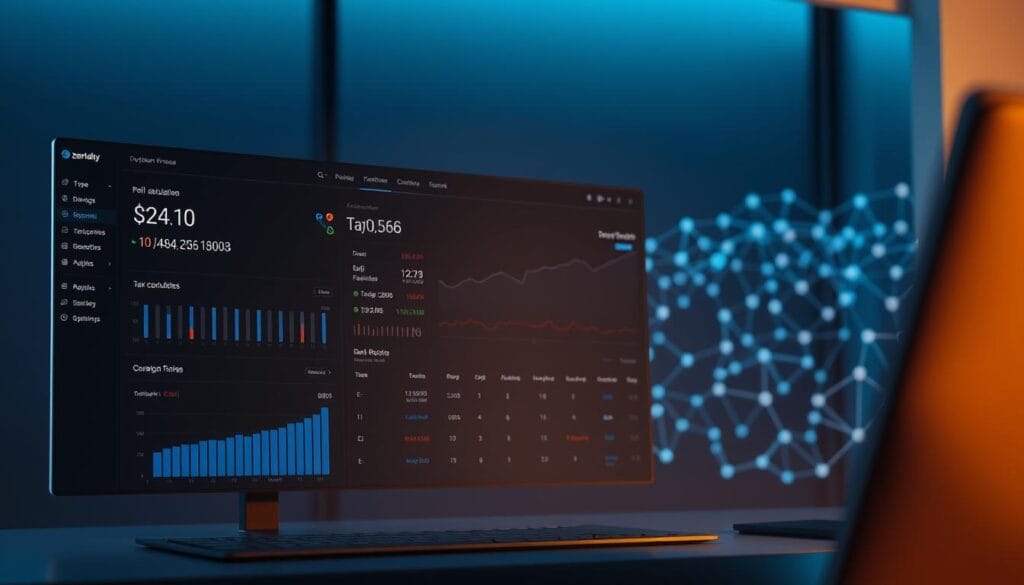
Decentralized finance participants face unique challenges when reconciling cross-chain activities and NFT sales. ZenLedger solves this through specialized tracking tools that map liquidity pool entries, yield farming rewards, and fractionalized NFT ownership. Custom algorithms decode smart contract interactions across 40+ blockchains, transforming fragmented data into coherent financial records.
The platform automatically categorizes staking income, airdrops, and governance token distributions as taxable events. Unlike generic tools, it calculates cost basis for NFT collections using time-weighted valuation methods – critical for assets with fluctuating floor prices. Users report 92% accuracy in automated form generation for Schedule 1 and Form 8949.
One DeFi trader notes:
“ZenLedger cut my reconciliation time by 80% compared to manual spreadsheets, especially for impermanent loss tracking.”
Real-time dashboards highlight potential discrepancies in wrapped token conversions or bridge transactions. The system flags unreported income from play-to-earn games and metaverse land sales, areas where traditional platforms often fail. These features make it indispensable for Web3 enthusiasts navigating complex earning streams.
Support resources include IRS audit guides tailored to DeFi activities and NFT capital gains. By addressing niche reporting needs, ZenLedger empowers traders to focus on strategy rather than compliance paperwork.
Emerging Trends in Crypto Tax Software for 2025

Technology is reshaping how investors manage digital asset obligations. Leading platforms now deploy AI-driven pattern recognition to classify complex transactions, from cross-chain swaps to NFT royalties. These systems reduce categorization errors by 63% compared to manual methods, according to recent fintech studies.
Real-time analytics dashboards are becoming standard, offering instant visibility into portfolio performance and liability estimates. One developer notes:
“Modern tools don’t just report history – they predict future obligations based on market movements.”
The push for global interoperability drives innovations in jurisdictional rule sets. Platforms now auto-detect residency changes and apply regional reporting standards, crucial for expatriates and multinational traders. This evolution addresses growing demands for cross-border transparency as regulations fragment worldwide.
Financial institution integrations mark another leap forward. Banks and brokerages increasingly sync transaction data directly with tax platforms, eliminating duplicate entries. Such partnerships streamline audits while ensuring consistency across traditional and digital asset holdings.
As adoption accelerates, expect tools to prioritize user education through interactive guides and scenario modeling. These features empower both casual users and institutional clients to navigate evolving frameworks confidently. The market’s trajectory suggests a shift from reactive compliance to proactive financial strategy.
Utilizing Crypto Tax Calculators and Free Tools for Simple Trades
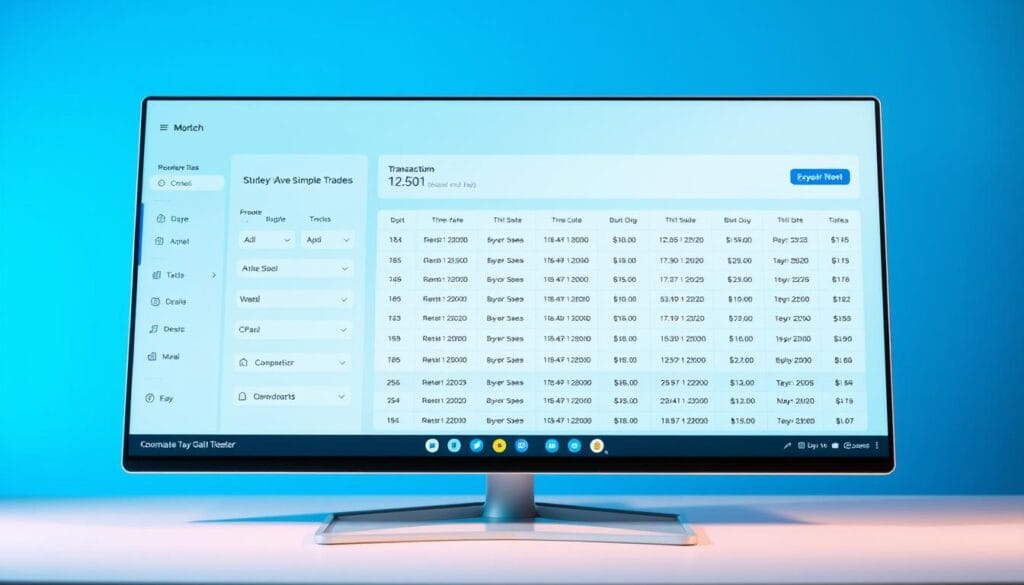
Investors managing fewer than 100 annual transactions can optimize reporting without premium solutions. Free calculators excel for straightforward portfolios involving basic swaps or occasional purchases. These tools eliminate spreadsheet headaches while maintaining IRS-ready outputs.
Best Practices for Limited Transaction Histories
Prioritize platforms with direct exchange API connections, even in free tiers. Automated imports reduce manual entry errors for crypto transactions. Verify classifications for airdrops or rewards – mislabeled events account for 34% of amended filings.
Free tools like CoinTracker’s basic plan generate Form 8949 Schedule drafts in minutes. Compare outputs against original trade confirmations to catch discrepancies. One user notes:
“The free version handled my 20 trades flawlessly, saving $150 on professional software.”
Paid solutions become cost-effective above 300 transactions or for DeFi activities. Free options often lack advanced features like multi-wallet sync or margin trade calculations. Ensure chosen tools integrate with mainstream filing platforms, even at no cost.
Always review auto-generated tax reports for:
- Accurate cost basis across lots
- Proper income categorization
- Consistent timestamps for trades
Simple doesn’t mean careless. Audit trails remain critical – download transaction logs post-filing. As regulations evolve, even minimal trading activity demands precision-aligned tools.
Integrations with TurboTax and Other Filing Software
Seamless connections between portfolio trackers and mainstream platforms now redefine efficiency in financial reporting. Leading solutions export formatted data directly into TurboTax, TaxAct, and H&R Block through one-click integrations. This interoperability eliminates manual transfers between systems – a common source of input errors.
Automatic synchronization ensures every transaction aligns with IRS requirements before submission. A CoinTracker user reports:
“My capital gains data flowed into TurboTax in minutes, cutting form preparation time by 75%.”
Platforms bridge gaps between niche tracking tools and established accounting software. QuickBooks and Xero users import categorized income streams directly into general ledgers. These connections maintain consistency across financial records while reducing reconciliation workloads.
Critical documents like Form 8949 Schedule generate automatically using verified cost basis data. Systems flag discrepancies between original trade confirmations and reported values, preventing costly amendments. Real-time validations ensure all filings meet current tax filing standards across jurisdictions.
Key advantages of integrated workflows include:
- Zero manual entry for transaction histories
- Instant error detection before submission
- Unified records across investment and accounting platforms
As regulations intensify, these partnerships between specialized tools and mainstream services become essential. They transform complex data into actionable insights while maintaining audit-ready documentation for every filing cycle.
Best Practices to Maintain Compliance in a Changing Market
Regulatory shifts demand proactive strategies for digital asset holders. Quarterly portfolio audits catch discrepancies before they escalate, with reports verifying transaction classifications and cost basis accuracy. One compliance officer notes:
“Reviewing wallet activity monthly prevents 90% of reporting errors during annual filings.”
Automated tools require regular configuration updates as jurisdictions implement new rules. Enable real-time alerts for legislative changes affecting trading activities or income thresholds. Platforms with version histories let users revert settings if updates cause unintended conflicts.
Consult certified professionals biannually to validate filing approaches. Specialists identify overlooked obligations like cross-chain transfers or decentralized exchange activity. This partnership proves critical when managing diversified portfolios spanning multiple asset classes.
Three safeguards reduce audit exposure:
- Archive platform-generated tax documents for seven years
- Cross-reference software outputs with original exchange statements
- Maintain logs of software updates and rule changes
Adaptability separates compliant traders from those facing penalties. By combining technological precision with human expertise, investors navigate evolving standards confidently. Staying ahead requires treating compliance as an ongoing process – not an annual checkbox.
Conclusion
As digital asset regulations tighten globally, accurate reporting becomes non-negotiable for investors. Specialized tools transform chaotic transaction records into precise filings, slashing error risks highlighted throughout this analysis. Platforms like Koinly and CoinLedger demonstrate how automation streamlines capital gains calculations while adapting to evolving standards.
The reviewed solutions prove that modern tax software must prioritize two factors: cross-platform integration and real-time updates. Active traders benefit from systems reconciling DeFi activities, while casual users gain clarity through intuitive dashboards. Choosing the right tool depends on transaction volume and portfolio complexity.
Investors should prioritize platforms offering audit trails and jurisdictional rule updates. These features optimize crypto tax management as markets evolve, turning compliance from an annual chore into a strategic advantage. With capital gains reporting growing more intricate, adaptable solutions remain essential for navigating this dynamic landscape.
Final selection hinges on balancing automation depth with user-specific needs. As demonstrated in comparative reviews, the best crypto tools don’t just report history – they future-proof financial strategies through intelligent design.

